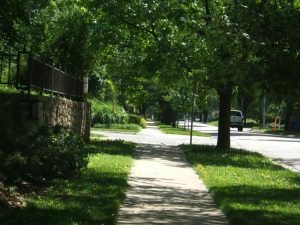This is from a new study out of the University of Illinois. It’s long known that bad neighborhoods raise stress, but this one quantifies the effect, and in terms of depression. It’s not hard to understand that staying cooped up inside, and feeling fearful leaving your house, would bring on depression. Next step, as the researcher says, is investing in neighborhoods to promote residents’ health (and for residents to start organizing to bring in these improvements):
Older Latinos living in the U.S. who perceive their neighborhoods as safer and more walkable are less likely to develop severe depressive symptoms, and the effect may be long term, a new study suggests.
Researchers examined links between the onset of depressive symptoms in 570 older Latino adults and various characteristics of the Greater Los Angeles neighborhoods they lived in, including crime, the availability and quality of sidewalks, traffic safety and aesthetics.
Participants ranged in age from 60 to 90, and 351 of them screened positive for low levels of depression at the outset of the study. When participants were rescreened 12 and 24 months later, a total of 19 (5.4 percent) of those with depression showed elevated symptoms.
However, people who perceived their neighborhoods as low in criminal activity and more walkable were less likely to develop severe depression, according to lead author Rosalba Hernandez, a professor of social work at the University of Illinois.
“Many times we look at individual-level factors or things within the individual’s family that contribute to mental health, but here we’re seeing it’s beyond that – it’s the neighborhood and other macro-systems that can impact psychological well-being,” Hernandez said.
“If there are neighborhood factors that decrease depressive symptoms, how do we figure out what those factors are and make appropriate investments, so we can have individuals who are psychologically well and environments that are flourishing?”
For the full story see: http://news.illinois.edu/news/14/1208walkability_RosalbaHernandez.html

